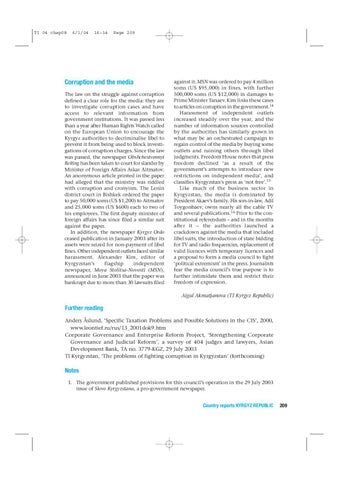TI 04 chap08
6/1/04
16:14
Page 209
Corruption and the media The law on the struggle against corruption defined a clear role for the media: they are to investigate corruption cases and have access to relevant information from government institutions. It was passed less than a year after Human Rights Watch called on the European Union to encourage the Kyrgyz authorities to decriminalise libel to prevent it from being used to block investigations of corruption charges. Since the law was passed, the newspaper Obshchestvennyi Reiting has been taken to court for slander by Minister of Foreign Affairs Askar Aitmatov. An anonymous article printed in the paper had alleged that the ministry was riddled with corruption and cronyism. The Lenin district court in Bishkek ordered the paper to pay 50,000 soms (US $1,200) to Aitmatov and 25,000 soms (US $600) each to two of his employees. The first deputy minister of foreign affairs has since filed a similar suit against the paper. In addition, the newspaper Kyrgyz Ordo ceased publication in January 2003 after its assets were seized for non-payment of libel fines. Other independent outlets faced similar harassment. Alexander Kim, editor of Kyrgyzstan’s flagship independent newspaper, Moya Stolitsa-Novosti (MSN), announced in June 2003 that the paper was bankrupt due to more than 30 lawsuits filed
against it. MSN was ordered to pay 4 million soms (US $95,000) in fines, with further 500,000 soms (US $12,000) in damages to Prime Minister Tanaev. Kim links these cases to articles on corruption in the government.14 Harassment of independent outlets increased steadily over the year, and the number of information sources controlled by the authorities has similarly grown in what may be an orchestrated campaign to regain control of the media by buying some outlets and ruining others through libel judgments. Freedom House notes that press freedom declined ‘as a result of the government’s attempts to introduce new restrictions on independent media’, and classifies Kyrgyzstan’s press as ‘not free’.15 Like much of the business sector in Kyrgyzstan, the media is dominated by President Akaev’s family. His son-in-law, Adil Toygonbaev, owns nearly all the cable TV and several publications.16 Prior to the constitutional referendum – and in the months after it – the authorities launched a crackdown against the media that included libel suits, the introduction of state bidding for TV and radio frequencies, replacement of valid licences with temporary licences and a proposal to form a media council to fight ‘political extremism’ in the press. Journalists fear the media council’s true purpose is to further intimidate them and restrict their freedom of expression.
Aigul Akmatjanova (TI Kyrgyz Republic)
Further reading Anders Åslund, ‘Specific Taxation Problems and Possible Solutions in the CIS’, 2000, www.leontief.ru/rus/13_2001dok9.htm Corporate Governance and Enterprise Reform Project, ‘Strengthening Corporate Governance and Judicial Reform’, a survey of 404 judges and lawyers, Asian Development Bank, TA no. 3779-KGZ, 29 July 2003 TI Kyrgyzstan, ‘The problems of fighting corruption in Kyrgyzstan’ (forthcoming)
Notes 1. The government published provisions for this council’s operation in the 29 July 2003 issue of Slovo Kyrgyzstana, a pro-government newspaper.
Country reports KYRGYZ REPUBLIC
209
